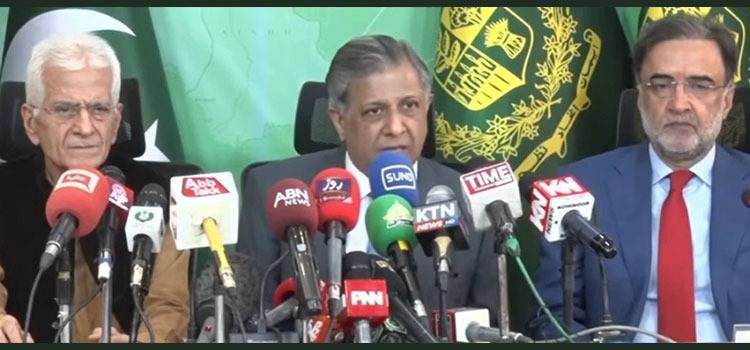
The coalition leaders on Thursday rejected the bench hearing the Supreme Court (Practice and Procedure) Bill, 2023, that seeks to limit the Chief Justice's powers.
Addressing a presser, Law Minister Azam Nazir Tarar called the formation of the bench "premature' and asked the top court to dissolve the bench in view of the ongoing legislations.
The representatives of the PML-N, PPP, MQM-P, ANP and other parties were part of the joint media talk.
Terming the situation "alarming", Tarar said that the "selective bench" of the court disregarded the rules.
"Two senior judges have not been included in the bench, formed after a pick and choose,” he said, in an apparent reference to Justices Qazi Faez Isa and Sardar Tariq Masood, the senior-most judges after the chief justice.
Pointing out a "conflict of interest", he added that the case involves CJ's powers, and all propriety rules prohibit the judge from leading the bench.
Read this too: Ruling Coalition Rebuffs 8-Member ‘Controversial’ Bench Formulated To Hear Pleas On SC Bill
Tarar highlighted that the provincial bar councils, too have expressed their disagreement with the bench in question, saying, "this matter should not be made a matter of ego."
He maintained that the Parliament has the powers to legislate for the people. "This right cannot be taken away from us by preventing parliament from legislating,” he remarked.
The minister said that that the divisions in the apex court are clear and that the people wanted 'one court, not two'.
Earlier today, the court suspended the parliamentary bill till a final verdict in the case. The bench, led by CJ Umar Ata Bandial, and comprising Justices Ijaz-ul-Ahsan, Munib Akhtar, Mazahar Naqvi, Muhammad Ali Mazhar, Ayesha Malik, Syed Hasan Azhar Rizvi, and Shahid Waheed took up the Supreme Court (Practice and Procedure) Bill, 2023.
It said, "there is a substantial, immediate and direct interference with the independence of the judiciary in the form of multiple intrusions."
Addressing a presser, Law Minister Azam Nazir Tarar called the formation of the bench "premature' and asked the top court to dissolve the bench in view of the ongoing legislations.
The representatives of the PML-N, PPP, MQM-P, ANP and other parties were part of the joint media talk.
Terming the situation "alarming", Tarar said that the "selective bench" of the court disregarded the rules.
"Two senior judges have not been included in the bench, formed after a pick and choose,” he said, in an apparent reference to Justices Qazi Faez Isa and Sardar Tariq Masood, the senior-most judges after the chief justice.
Pointing out a "conflict of interest", he added that the case involves CJ's powers, and all propriety rules prohibit the judge from leading the bench.
Read this too: Ruling Coalition Rebuffs 8-Member ‘Controversial’ Bench Formulated To Hear Pleas On SC Bill
Tarar highlighted that the provincial bar councils, too have expressed their disagreement with the bench in question, saying, "this matter should not be made a matter of ego."
He maintained that the Parliament has the powers to legislate for the people. "This right cannot be taken away from us by preventing parliament from legislating,” he remarked.
The minister said that that the divisions in the apex court are clear and that the people wanted 'one court, not two'.
Earlier today, the court suspended the parliamentary bill till a final verdict in the case. The bench, led by CJ Umar Ata Bandial, and comprising Justices Ijaz-ul-Ahsan, Munib Akhtar, Mazahar Naqvi, Muhammad Ali Mazhar, Ayesha Malik, Syed Hasan Azhar Rizvi, and Shahid Waheed took up the Supreme Court (Practice and Procedure) Bill, 2023.
It said, "there is a substantial, immediate and direct interference with the independence of the judiciary in the form of multiple intrusions."

